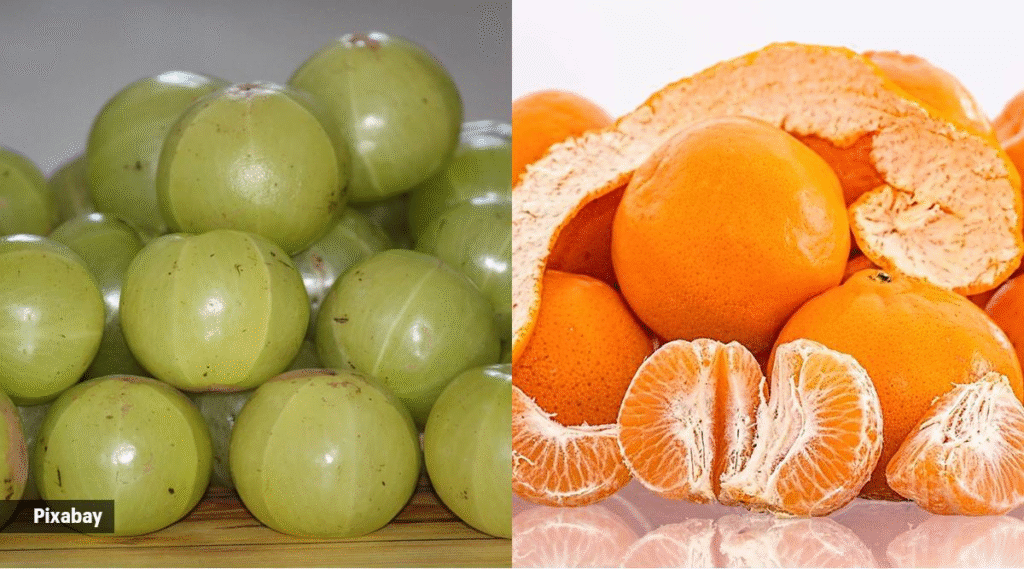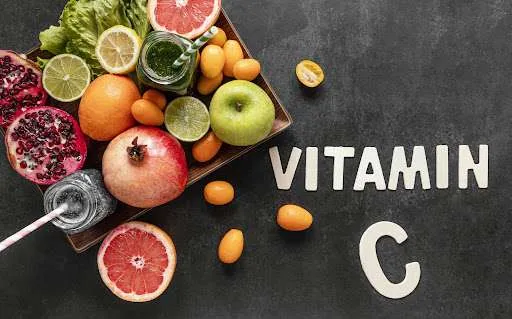Vitamin C is one of the most essential nutrients your body needs for immunity, collagen production, glowing skin, and overall well-being. It’s not just about avoiding colds — this water-soluble vitamin plays a vital role in maintaining healthy blood vessels, bones, and skin. And when it comes to getting enough Vitamin C naturally, fruits are your best friend.
But which fruits pack the biggest punch? Are lemons really the best source? And how much Vitamin C should you be consuming daily?
In this blog, we uncover the top fruits that boost Vitamin C levels, share expert insights from fitness coaches, and guide you on how to include these nutrient-rich options in your daily diet.
What is Vitamin C and Why is it Important?
Vitamin C (ascorbic acid) is a powerful antioxidant that helps:
- Strengthen the immune system
- Promote faster wound healing
- Boost iron absorption
- Maintain skin elasticity by supporting collagen synthesis
- Reduce oxidative stress in the body
Since your body doesn’t store Vitamin C, it’s crucial to get a fresh supply every day through your diet.
How Much Vitamin C Do You Need Daily?
According to health guidelines:
- Adult women require about 75 mg per day
- Adult men require about 90 mg per day
- Smokers may need an extra 35 mg daily
- During pregnancy or lactation, needs may increase to 85–120 mg
Now, let’s look at the fruits that can help you meet — and exceed — these daily recommendations naturally.
Top 10 Fruits Rich in Vitamin C

1. Guava – A True Powerhouse
Guava contains a whopping 200–250 mg of Vitamin C per 100 grams — that’s more than 2x your daily requirement in just one fruit. It’s also packed with fiber, which supports digestion and gut health.
Best way to eat: Raw with a pinch of salt or in smoothies and fruit salads.
2. Kiwi – Small Fruit, Big Benefits
One medium kiwi contains about 70 mg of Vitamin C. It’s also a great source of potassium and vitamin K, making it a top fruit for overall health and skin hydration.
Best way to eat: As a post-workout snack or added to yogurt or breakfast bowls.
3. Amla (Indian Gooseberry) – Traditional Yet Powerful
Amla is one of the richest sources of Vitamin C in India, with about 250–300 mg per 100 grams. It also has strong anti-inflammatory and antioxidant properties.
Best way to eat: Raw, as juice, or in chutneys and pickles.
4. Oranges – The Classic Citrus King
Oranges are well-known for their Vitamin C content, with one medium orange offering about 60–70 mg. They’re also high in water content, keeping you hydrated.
Best way to eat: Freshly peeled, juiced, or in fruit salads.
5. Strawberries – Sweet and Nutritious
One cup of strawberries delivers about 85 mg of Vitamin C. They’re also high in antioxidants and can help protect the skin from UV damage.
Best way to eat: In smoothies, as a topping, or fresh with a handful of nuts.
6. Papaya – Tropical and Nutrient-Rich
A single cup of papaya provides over 85 mg of Vitamin C. It also contains enzymes like papain that support digestion.
Best way to eat: Fresh in the morning, blended into juices, or with lime.
7. Pineapple – Juicy Immunity Booster
Pineapple has around 79 mg of Vitamin C per cup. It’s also known for bromelain, a compound that aids digestion and reduces inflammation.
Best way to eat: Fresh, grilled, or juiced with mint.
8. Mango – The King of Fruits
While not as rich as guava or amla, mangoes still provide around 36 mg per cup and are packed with vitamin A, which complements Vitamin C’s effects on the skin and immune system.
Best way to eat: As a seasonal treat, in smoothies, or salads.
9. Lemons and Limes – Zesty and Effective
One lemon contains about 30–40 mg of Vitamin C. It’s commonly used in detox drinks and salads for its refreshing flavor and immunity boost.
Best way to eat: In warm water, lemon tea, or as salad dressing.
10. Blackcurrants – Antioxidant Powerhouse
These small berries are often overlooked but carry a high Vitamin C content — around 180 mg per 100 grams. They’re also rich in anthocyanins, which protect against cellular damage.
Best way to eat: In jams, smoothies, or dried as a snack.
Which Fruit Has More Vitamin C Than a Lemon?
- Guava, Amla, Kiwi, Blackcurrants, and even papaya contain more Vitamin C than lemons.
- Surprisingly, guava and amla deliver 4–5 times more Vitamin C than a lemon.
Fruits Rich in Both Vitamin C and Zinc
Zinc is another essential nutrient that boosts immunity, and when paired with Vitamin C, the benefits are amplified.

Here are fruits that provide both:
- Guava – High in Vitamin C and trace amounts of zinc
- Pomegranate – Supports immune health and contains some zinc
- Berries (strawberries, blueberries) – Rich in antioxidants, Vitamin C, and small zinc levels
- Bananas – Not high in Vitamin C but provide a moderate zinc supply when combined with other fruits
For a balanced intake, pair fruits with nuts, seeds, or yogurt, which are excellent zinc sources.
Vitamin C for Skin Health
Vitamin C is one of the most popular skincare ingredients for a reason. It helps:
- Brighten the complexion
- Fade dark spots and pigmentation
- Boost collagen, improving skin elasticity
- Protect against sun damage and pollution
To get the most skin benefits, consume Vitamin C-rich fruits daily and consider a topical serum with stabilized Vitamin C for direct skin application.
Vegetables Rich in Vitamin C
Don’t forget that vegetables also contribute significantly to your daily Vitamin C intake:
- Bell Peppers (especially red and yellow) – 120–190 mg per 100g
- Broccoli – 90 mg per 100g
- Kale – 120 mg per 100g
- Brussels Sprouts – 85 mg per 100g
- Tomatoes – 20–30 mg per 100g
- Spinach – 30 mg per 100g
Incorporating both fruits and vegetables ensures a consistent Vitamin C supply throughout the day.
Tips to Maximize Vitamin C Absorption
- Consume fresh: Vitamin C is sensitive to heat and light. Try to eat fruits and vegetables raw or lightly cooked.
- Avoid long storage: The longer food is stored, the more Vitamin C it loses.
- Pair with iron: Vitamin C improves the absorption of non-heme iron (from plant sources), helping prevent anemia.
- Stay hydrated: As a water-soluble vitamin, Vitamin C works best when your body is well-hydrated.
Conclusion: Natural Sources of Vitamin C Are the Best Choice
Vitamin C is essential, and the best way to ensure you’re getting enough is through fresh, whole foods — especially fruits. While lemons are commonly associated with Vitamin C, they’re not the richest source. Guava, amla, kiwi, and papaya far exceed lemons in Vitamin C content and offer additional health benefits like fiber, antioxidants, and enzymes.
Whether you’re looking to boost immunity, improve skin health, or simply maintain a well-balanced diet, including a variety of Vitamin C-rich fruits daily is one of the simplest and most effective health habits you can adopt.
Instead of relying on supplements, start by adding a bowl of fresh fruit to your breakfast, a squeeze of lemon in your water, or a guava as your afternoon snack — and watch your energy, skin, and immunity improve naturally.



